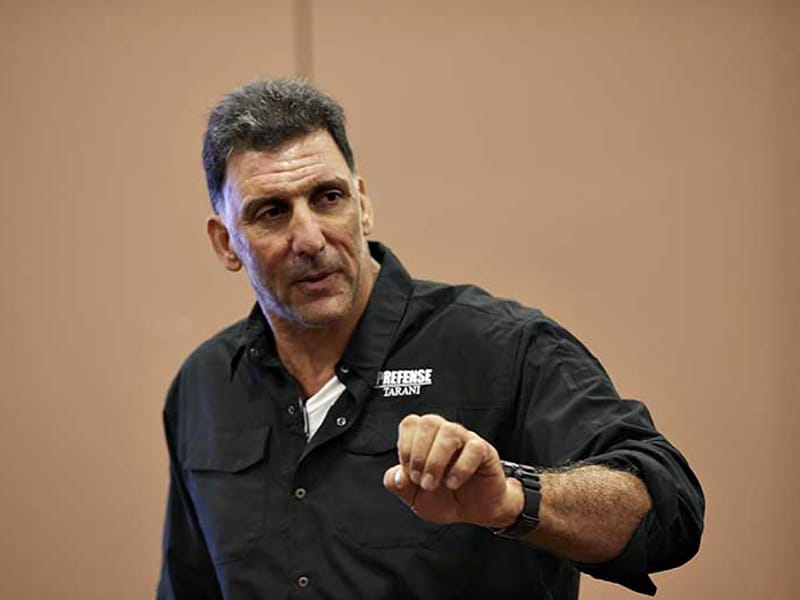We humans are born with a useful gift of subliminal sensory perception. Some call it a gut feeling or hunch, and others an ‘intuitive hit.’ Regardless of how it is described, the bottom line is that we can rapidly and accurately sense when something just doesn’t seem right.
Referred to as “ego” in psychoanalytic theory, it is described as that portion of the human personality that is experienced as the “self” and is in direct engagement with the external world through perception. And it’s this perception and intuition that, when used correctly, is vital to self-defense and emergency preparedness and allows us to harness the power of fight or flight.

Your Early Warning System
Spiritual masters claim that “feelings are the language of the soul,” and depending upon your belief system, some claim that there exist certain aspects of our humanity that are not attributed to the meat body.
In his book “Gift of Fear: and Other Survival Signals that Protect Us from Violence,” renowned protection expert Gavin de Becker, claims that “everyone can feel safer, act safer, be safer — if they learn how to listen to their own sixth sense about danger.”
Decisions are made based on logic, emotion, or intuition. As such, in his book, “Blink,” describing the intuitive parts of decision-making, best-selling author Malcolm Gladwell discusses what he calls “thin-slicing.” He states that there can be “as much value in the blink of an eye than in months of rational analysis.”
Gladwell encourages his readers not to dismiss their first thought in favor of acquiring additional information. Some people are more intuitive than others, which doesn’t necessarily translate to greater intelligence or gaining access to more information.
Security experts refer to the use of such innate senses for personal safety and emergency preparedness as “situational awareness” where the functional component of consciousness, information assessment, and judgment is engaging your mind. It is your mind that takes any incoming information, processes it, and makes a determination based on assessment. It’s not the eyes that do this but the mind.
The term “adaptive consciousness” was first coined by social psychologist Daniel Wegner in 2002. He defined it as “a set of mental processes that is able to affect judgment and decision-making.” In other words, it is an unconscious mental process influencing judgment and decisions. It differs from conscious processing in that it is faster, effortless, and more directly focused on the present.
A hunch is an impression that something might be the case. It can range all the way from an expectation to a premonition or presentiment to a suspicion. Presentiment is a term attributed to an intuitive feeling about the future, especially one of foreboding.
Presentiment, hunch, adaptive consciousness, thin slicing, the gift of fear, an intuitive hit, gut feeling, sixth sense, or whatever you want to call it, is when you “just know” that something isn’t quite right. It is the most sublime of all your onboard early warning detection faculties and should not be ignored.
Early Warning Examples
Real-world examples of such early warning include any time you “just got a feeling” about someone you first met. You can’t really describe it rationally, but it’s a sense you get about that person.

Have you ever thought about someone, and that same person called you out of the blue? You raise your eyebrows when you see their name pop up on your phone as you think “Huh, I was just thinking about them!”
Another example of an early warning might be when you’re sitting at a red light or in a crowded room and you get the sense that someone is looking at you. You then look over in that direction you sensed and your eyes confirm that yes, that person is in fact looking at you. In this example, you perceived not only that someone was looking at you, but also from which direction.
We can all claim similar experiences or something along those same lines of “just knowing by knowing.” Few argue that we have this ability, but many choose to ignore it. You can choose to pay attention to such early warning potential threat indicators, or you can completely disregard them, the choice is yours. It is said that we are free to choose but are not free from the consequence of our choice.
The following are two real-world examples of the consequence of choosing to ignore an early warning.
Rationality versus Intuition
It was closing time for a retail gift store located in an urban shopping mall when a female store manager was locking up for the night. She was turning the key which locked the glass front door of the shop when she noticed a well-dressed man approach the closed door smiling and waving his hand.
As he approached, she explained later in an interview that, his presence “gave me a sinking feeling in the pit of my stomach.” She spoke loudly and firmly through the glass that the store was closed and that he would need to come back tomorrow if he wanted to shop.
She completed her process of securing the door, removed the keys, and was turning away to set the alarm when the man tapped on the glass to get her attention. He explained to her that it was his wife’s birthday and that he just couldn’t go home to her empty-handed.
The store manager rationalized that the man appeared well-dressed and clean-shaven, and kept talking about his wife and how he wanted to bring her a gift for her birthday. However, as she stated in her interview, “Every part of my being told me not to open that door”.
Instead of heeding her internal admonitions, she overrode her presentiment, hunch, adaptive consciousness, thin slicing, gift of fear, intuitive hit, gut feeling, and sixth sense, and surrendered to the lines he was delivering, preying upon her sentiments. Knowing deep down inside that it was not the right thing to do, she opened the door to let him in.
Hours later the paramedics were barely able to keep her alive as they diligently worked on her, speeding to the nearest trauma center. The man had physically beaten her to within an inch of her very life and robbed the store.
Lucky to have survived and recovering from both physical and psychological damage, she closed the interview with the statement that she would never again dismiss her intuition.
Hey, Nice Axe
An incident occurred at a convenience store in a populated area where a person carrying a large brightly colored two-handed axe walked through the front door during regular business hours.
The security cameras show a young man looking at this person holding an axe with surprise as he realized what an anomaly it is that someone would casually walk into a convenience store clutching an axe with both hands.
Although every bell and whistle of his early warning system went off, the young man disregarded these warnings and engaged the person in conversation. The cameras roll on to illustrate the brutal attack on not only the same guy but also another bystander close to the cash register.
The attack was swift and could have been fatal. Both victims suffered a physical injury caused by the axe and were lucky to be alive to tell about it.
Many people take steps to protect themselves and their property by attending self-defense classes, buying dogs, or engraving their property with some sort of identification. However, few view their own situational awareness as paramount in ensuring their personal safety.
Presentiment, hunch, adaptive consciousness, thin slicing, gift of fear, an intuitive hit, gut feeling, or your sixth sense are the most intimate aspects of your situational awareness. Observing a blip on your personal awareness radar, regardless of how it got there, is all the alert you need to know that something is up.
Your early warning system is already installed, organically encoded, instantly usable, doesn’t require training, is faster than mental processing, and is usually ignored. You can listen to it if you choose, or you can choose to disregard it—the choice is yours, as is the consequence of that choice.


